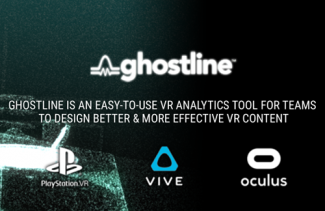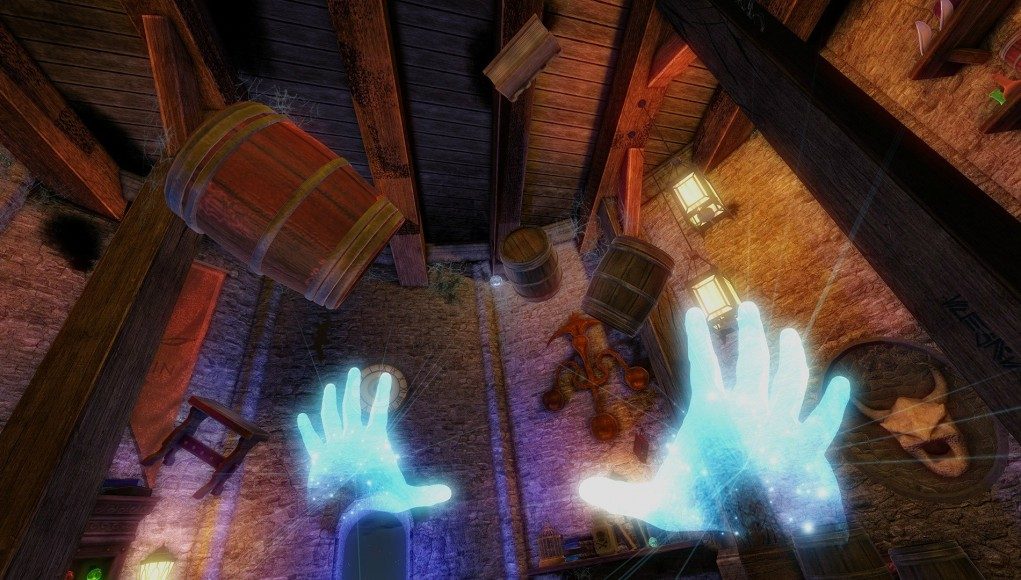Aldin Dynamics has released a detailed breakdown of user data gathered during over 300,000 sessions of Waltz of the Wizard gameplay. Launched in May 2016, the motion-controlled VR game was developed with the insights gained from using Aldin’s own data visualisation tool Ghostline.
 Dedicated to VR software development since early 2013, Aldin Dynamics is one of the most experienced studios in the world, launching software on Oculus developer kits and Gear VR. In May 2016, their motion control game Waltz of the Wizard launched on Steam for free, and quickly became a popular showcase for the HTC Vive, having seen over 300,000 sessions from over 100,000 players. It is currently the highest-rated VR app on Steam.
Dedicated to VR software development since early 2013, Aldin Dynamics is one of the most experienced studios in the world, launching software on Oculus developer kits and Gear VR. In May 2016, their motion control game Waltz of the Wizard launched on Steam for free, and quickly became a popular showcase for the HTC Vive, having seen over 300,000 sessions from over 100,000 players. It is currently the highest-rated VR app on Steam.
Editor Update 11/03/2017: Aldin Dynamics reached out after this article was published and asked us to clarify Ghostline’s data gathering scope and methodology. “Aldin would like to clarify that the Polygon article referenced [in this article] is written about an early version of the tool used in local testing and quality assurance. Motion data in Waltz of the Wizard is only sampled in few second clips at strategic places where developers need to ensure that game mechanics are functioning as intended.”
However, the wizardry is more than skin deep. The game acts as a test bed for Aldin’s real flagship software, Ghostline. This large-scale analytics and visualisation tool has been in development in since January 2015, served a vital role in prototyping Waltz of the Wizard’s level design and gameplay, and now acts as a rich data source for VR user habits within the released game. As described in this Polygon feature, Ghostline has the ability to record the actions of every user (via automatic, anonymous data collection), which can be replayed and viewed from any perspective, including from the original first person view. This ‘user ghost’ visualisation is far more efficient and less intrusive than shooting video of people playing in VR, and has many other benefits of in terms of detailed analysis of usage patterns and behaviour.
 Aldin Dynamics has now shared some of the data created within Waltz of the Wizard using their Ghostline technology. As a game designed to demonstrate room-scale VR while accommodating standing VR, some of these stats aren’t too surprising – with 87% of players using a room-scale space. Understandably, play time is higher in room-scale, with session lengths 19% longer and lifetime averages 72% longer; the game is simply more engaging when given more freedom to move around.
Aldin Dynamics has now shared some of the data created within Waltz of the Wizard using their Ghostline technology. As a game designed to demonstrate room-scale VR while accommodating standing VR, some of these stats aren’t too surprising – with 87% of players using a room-scale space. Understandably, play time is higher in room-scale, with session lengths 19% longer and lifetime averages 72% longer; the game is simply more engaging when given more freedom to move around.

The detailed room-scale space breakdowns by country follow some logical patterns too, as countries with vast land mass like China, USA and Canada have the largest average play areas (China is highest at 5.9m²), and the densely-populated Japan has the smallest at 4.4m². Some of the less-specialised stats such as audience and hardware data are already available through Steam’s own tools, but Ghostline’s ability to combine every metric in such detail is unprecedented.
One of the most critical stats is that room-scale players physically look around 18% more than standing players, which has many implications for level/gameplay design – trying to cater to the standing player who is on average more reluctant to turn their head. The vast quantity of interaction/movement data available to Ghostline allows for a granular analysis of players’ physical behaviour. Within each scene from the game, it displays data relating to the amount of physical locomotion, button presses and head movement in degrees. The Wizard’s Tower scene, which contains the spell mixing table, scores the highest on interactivity, while the Hallway, which presents a sudden change of atmosphere ‘designed to induce a fight or flight response’, results in the highest level of physical movement.
 The granularity continues into the more amusing stats. Of course, nobody can resist causing damage – over 19 million crossbow bolts have been fired, and over 14 million fireballs have been cast. The wizard’s assistant has been shot over 29,000 times, and ‘Skully’ has been thrown out of the window by 5% of players, and drowned in the cauldron 17% of the time. Some stats may seem trivial, but as Aldin explains, “the smallest of details can make or break an experience. For this reason it is absolutely vital to pay careful attention to the user experience and ensure that your content is having the exact impact that you envision”. Aldin believes that analysing at the level Ghostline provides is key to making a great experience, and Waltz of the Wizards’ unmatched 99% approval rating on Steam is testament to that theory.
The granularity continues into the more amusing stats. Of course, nobody can resist causing damage – over 19 million crossbow bolts have been fired, and over 14 million fireballs have been cast. The wizard’s assistant has been shot over 29,000 times, and ‘Skully’ has been thrown out of the window by 5% of players, and drowned in the cauldron 17% of the time. Some stats may seem trivial, but as Aldin explains, “the smallest of details can make or break an experience. For this reason it is absolutely vital to pay careful attention to the user experience and ensure that your content is having the exact impact that you envision”. Aldin believes that analysing at the level Ghostline provides is key to making a great experience, and Waltz of the Wizards’ unmatched 99% approval rating on Steam is testament to that theory.







